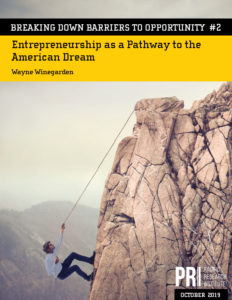 A new study released today by the nonpartisan Pacific Research Institute finds that government has erected barriers to opportunity that make it very difficult for immigrant and low-income entrepreneurs to lift themselves out of poverty and climb the economic ladder.
A new study released today by the nonpartisan Pacific Research Institute finds that government has erected barriers to opportunity that make it very difficult for immigrant and low-income entrepreneurs to lift themselves out of poverty and climb the economic ladder.
“Government-created barriers to opportunity are standing in the way of immigrants and low-income entrepreneurs launching a startup and accessing credit and capital to grow their business and hire more workers,” said Winegarden. “Breaking down these barriers and embracing free-market reforms are perhaps the most important things we can do to lift people out of poverty.”
“Entrepreneurship as an Opportunity to the American Dream” makes the case that empowering lower-income entrepreneurs is key to reducing poverty in the United States. However, harmful government policies and regulations make it tough for those at the bottom to get their startups off the ground, hire more people, and make a better life for their families.
Specifically, the study cites external research showing that:
- Small businesses with fewer than 50 employees pay nearly $12,000 per worker to comply with regulations.
- Complying with the tax code costs employers with 1 to 5 employees approximately $4,300 per employee.
- Starting a business takes an estimated 4.4 times the median net worth of the average African-American household and four times the median net worth of the average Latino family.
To lower startup costs and increase available cash for immigrant and low-income entrepreneurs, Winegarden recommends:
- Simplifying the tax code to lower taxes on self-employment and small businesses;
- Allowing more flexibility for tax-free retirement and health care accounts, so they can be used for long-term savings;
- Reforming occupational licensing and workers compensation laws;
- Stopping harmful policies like the $15 minimum wage that drive up costs;
- Right-sizing regulations on microlenders and community banks so they can better serve low-income and immigrant entrepreneurs and increase their access to credit and capital.
“Entrepreneurship is key to helping our nation’s poor and immigrants from around the world work their way into the middle class and achieve the American dream,” said Winegarden. “There is no better way to help people chart a more prosperous future for themselves and their families than by empowering low-income entrepreneurs to thrive.”
Forthcoming studies in the Breaking Down Barriers to Opportunity series will explore how regulations negatively affect small business opportunities in health care and technology.

